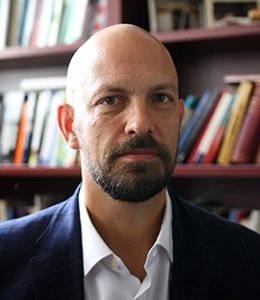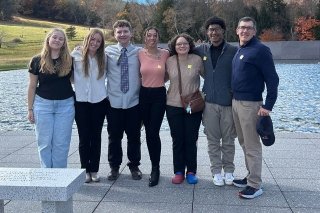Podeschi Publishes Research on Fracking Impacts
Bloomsburg
Posted

Christopher Podeschi, associate professor of sociology, has been gathering data on and studying the social impacts of hydraulic fracturing in Pennsylvania since 2013. Recently, that work has resulted in three article publications. Numerous BU sociology majors have supported this work over the years, and one, Ethan Minier (2014), is even a co-author for one publication. BU faculty co-authors include Dr. Jeff Brunskill, associate professor of geography, Dr. John Hintz, professor of geography, and Dr. Heather Feldhaus, professor of sociology and interim dean of graduate studies. The publications include:
Podeschi, Christopher, Lisa Bailey-Davis, Ethan Minier, Heather Feldhaus, John Hintz, and Jacob Mowery. 2021. “The Wider Array: A Qualitative Examination of the Social and Individual Impacts of Hydraulic Fracturing in the Marcellus Shale.” In Energy Impacts: A Multidisciplinary Exploration of North American Energy Development, Edited by Jeffrey B. Jacquet, Julia H. Haggerty, and Gene L. Theodori. Louisville, Co.: University Press of Colorado.
This peer-reviewed book chapter (https://upcolorado.com/university-press-of-colorado/item/3875-energy-impacts) reports on qualitative analysis of focus group sessions conducted in shale-impacted communities with a grant to the research team from Geisinger through the Degenstein Foundation. Subjects discussed impacts that would be expected in any “boomtown” scenario - like strain on local services and fear of crime from newcomers. Other impacts, however, were unique to the way the natural gas industry spreads well-pads throughout relatively high-density rural areas and makes contracts with individual landowners. Participants raised concerns about tension within the community and families, regular disturbances from things like traffic and noise, changes to familiar landscapes, the industry’s business practices, and environmental impacts.
Podeschi, Christopher, Jeffrey C. Brunskill, and Gene L. Theodori. Forthcoming. “Fracking Boomtowns? Proximity, Intensity, and Perceptions of Shale Gas Extraction in Hughesville and Jersey Shore, Pennsylvania,” Energy Research & Social Science.
This work was supported with a BU grant that funded an extensive 2018 survey in two Lycoming County, Pennsylvania communities that experienced the heavy wave of Marcellus Shale development. The research tested whether proximity to industry activity affected the degree of support for hydraulic fracturing and perceptions of social and environmental impacts from hydraulic fracturing. One of the few of its kind, the study shows that proximity matters – exposure to varied and significant disturbances from the industry’s activities reduce support and strengthen views of social and environmental impacts. The effect of proximity remains strong even when controlling for other predictors of opinions about hydraulic fracturing like political orientation or degree of benefits from the industry.
Theodori, Gene L. and Christopher W. Podeschi. 2020. “Impacts of Marcellus Shale gas extraction: Examining recollected pre-development and post-development perceptions.” The Extractive Industries and Society 7(4):1438-1442.
Using the same 2018 survey data from Lycoming County, this study examined impacts respondents expected from the heavy wave of hydraulic fracturing activity before it started and what impacts they felt had actually occurred as a result of that activity. Results showed that residents expected negative effects on a large set of social and environmental issues (e.g., groundwater contamination, noise, crime), and they reported that these indeed did worsen, but not by as much as they expected. On a set of economic issues (e.g., poverty, job availability), they reported expecting conditions to improve, and they felt that most of these did improve, but again, overall respondents felt they did not improve as much as expected. Overall the findings suggest that for people who experienced hydraulic fracturing, neither its promises nor its perils were as significant as expected.



